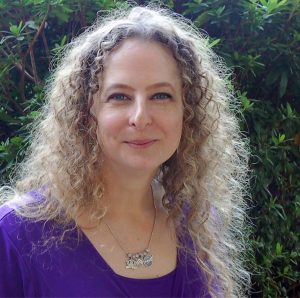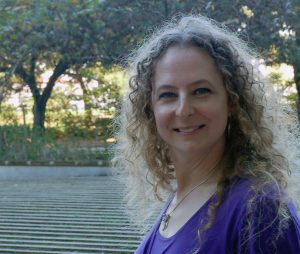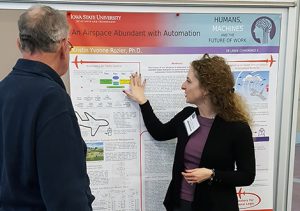 Kristin Yvonne Rozier applied for the Computer Science Ph.D. program at Rice in order to meet the conditions of a job offer from NASA. “My path was a little unusual,” she said. “I discovered my dream job at NASA while working in another division of their Langley Research Center. One of the job requirements was a Ph.D., but I applied for the job anyway and they were willing to offer it to me –as long as I immediately began pursuing a full time Ph.D.”
Kristin Yvonne Rozier applied for the Computer Science Ph.D. program at Rice in order to meet the conditions of a job offer from NASA. “My path was a little unusual,” she said. “I discovered my dream job at NASA while working in another division of their Langley Research Center. One of the job requirements was a Ph.D., but I applied for the job anyway and they were willing to offer it to me –as long as I immediately began pursuing a full time Ph.D.”
She’d been working at Langley for two years, after completing her master of computer science degree at The College of William and Mary. “I’d grown a lot in my role at Langley,” she said, “and then I discovered the Formal Methods Research Group.”
While working on her masters, logic and proofs were the areas that had most captivated her attention. Now the research group at Langley had an opening for her dream job. Rozier said, “If a job description could have been downloaded from my imagination, this would have been it. It sounded amazing, and then I met the people on the team. They were even cooler than I had hoped.”
 She wanted to focus on automata, a type of labeled graph used in algorithms for formal verification of safety-critical systems. “The formal methods are based in automata theory, set theory, and mathematical logic. The job would be focused on the research topics I loved and the puzzles I wanted to solve. Plus, all of it would be directed to helping humanity by making safety-critical systems more safe. It was something I simply had to pursue,” said Rozier.
She wanted to focus on automata, a type of labeled graph used in algorithms for formal verification of safety-critical systems. “The formal methods are based in automata theory, set theory, and mathematical logic. The job would be focused on the research topics I loved and the puzzles I wanted to solve. Plus, all of it would be directed to helping humanity by making safety-critical systems more safe. It was something I simply had to pursue,” said Rozier.
The caveat to her job offer was the condition of applying and being accepted immediately into a full-time research Ph.D. program that she would pursue while working full-time for the Langley Research Center in Hampton, Virginia. The researcher Rozier most wanted to work with was Moshe Vardi at Rice University in Houston, Texas.
“Moshe is a very senior and important researcher who continues to make breakthroughs throughout his career. He didn’t just make one discovery and keep refining or repeating it, he has multiple areas of research and I would have been excited to work in any one of them.” she said.
Rozier was also impressed by Vardi’s reputation for having very high standards. “If you make it through his group, it means a lot,” she said. “So I reached out to him. I was inspired by his work with automata and wanted to expand on that. When he called and said he wanted me to come to Rice as his Ph.D. student, I was so excited.”
Just as she expected, Vardi offered her brilliant direction for her research in automata. NASA had given her two years to be “away” while she completed the coursework requirements for her Ph.D. and then she would work on the continuing research and publication aspects of her degree while working at Langley. So she moved to Houston for three semesters and followed Vardi to Cambridge, where he spent seven months on a sabbatical.
“Once my courses were finished, I was working 9-5 for NASA and then 5–3 for Rice,” said Rozier. She would sleep from 3:00 a.m. until 8:00 a.m., and then get ready to go back to Langley again. “Sometimes I got a break – when work could be counted double – like when NASA needed someone to learn something I was working on at Rice. Luckily, my publications could also usually count for both, but I didn’t get a lot of sleep those years.”
Still, she was doing work she loved. The only reason she finally considered making a change was so that she could finally live in the same city as her husband. “They call it the ‘two body’ problem,” she said, “when two Ph.D.s are married and each has an active research career. I even transferred from Langley to Ames just to be close to my husband but he was only there two months before he was transferred to another state.”
Rozier had been married to Eric Rozier for 13 years and living apart for 11 years when they both discovered an opportunity to pursue their research goals in academia. She teaches in the Aerospace Engineering department at Iowa State University, and he’s teaching Computer Science. Rozier said, “You don’t want to move somewhere where only one of you has your dream job. It’s really tremendous at Iowa State that we both have fantastic colleagues and really enjoy our jobs. We have incredible support here. Neither of us is sacrificing for each other. These are jobs we would have wanted anyway.”
Recently, her passion for teaching and research was recognized by the National Science Foundation. Rozier received the prestigious NSF Faculty Early Career Development (CAREER) Award and funding for her proposal on theoretical foundations to introduce unmanned aerial systems –like drones– into the National Air Space while ensuring the safety of people and property on the ground.

Kristin Y. Rozier explains the focus of her research in a poster at the 2016 De Lange Conference at Rice University.
Her CAREER-funded research is one of several projects she is working on with NASA, and Rozier travelled to Houston in December to meet with colleagues and present a poster on one of the projects at Rice University’s De Lange Conference. She said, “I’m thrilled to be collaborating with my amazing colleagues at Langley, Ames and Johnson on three different grants.”
Her advice for other CS Ph.D. students is to have a clear vision about what they want to do and why they are in the program.
“PhDs are notoriously difficult, and many talented people don’t finish. There is nothing wrong with that, but if you know your vision and what opportunities you want to pursue, you can respond when opportunities come up. When NASA said ‘we’ll give you your dream job but you have to do a PhD,’ I knew immediately it fit in my dream job and that it would be worth whatever sacrifice I needed to make. Knowing that powered me through the tough times.”
Kristin Rozier completed her Ph.D. in CS in 2012. Her adviser was Moshe Vardi.
